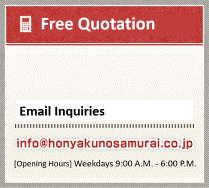Certificates
 Samurai Translators deals with a lot of official document and certificate translations and always issues a Certificate of Translation for these translations. Official documents and certificates are, as a rule, issued by competent authorities and attested and signed or sealed by an authorized official. To accurately translate these types of official documents and certificates, background knowledge of the law is often required. We have the right experience and expertise to translate your documents accurately and swiftly. We can offer helpful advice regarding the submission of such documents to embassies and immigration departments based on the wealth of experience we have acquired over our long years of handling translations and queries from our clients in this area.
Samurai Translators deals with a lot of official document and certificate translations and always issues a Certificate of Translation for these translations. Official documents and certificates are, as a rule, issued by competent authorities and attested and signed or sealed by an authorized official. To accurately translate these types of official documents and certificates, background knowledge of the law is often required. We have the right experience and expertise to translate your documents accurately and swiftly. We can offer helpful advice regarding the submission of such documents to embassies and immigration departments based on the wealth of experience we have acquired over our long years of handling translations and queries from our clients in this area.
We have an excellent performance record when it comes to any of the following documents.
Translation Requirements when Submitting Official Documents to Embassies and Other Institutions
In Japan and England there is no nationally recognized license for the translation industry. Also unlike in a number of other countries, there is not a mandatory standardized translator's qualification accredited by a translation association.
In this situation, a Certificate of Translation stating the name, address and telephone number of the translation company, the name of translator and affixed with the company seal is recognized by many institutions as being equivalent to a certified translation. Usually, the Certificate of Translation is printed on the company's letterhead and is signed and sealed. This is what is generally provided with certificate translations and is equivalent to what is referred to as a Certified Translation in English.
Depending on the organization, official documents may not necessarily need to be translated by a third party (in this case, self-translated documents are acceptable), therefore we recommend that you check the translation requirements of the organization you intend to submit your documents to. In this case, even if you hire a translation company to translate your documents, you can submit them as your own translations.
For translations requiring certification by a translation company, it is more beneficial and cost effective to turn to a translation company with experience in translating official documents and a wide range of certificates. Here at Samurai Translators, we have been involved in the on-going business of certificate translations required for visa applications, therefore, our Certificate of Translation has been widely used in application documents to immigration offices of countries around the world as wll as other institutions. Our translations are word for word translations of the original official document and as such they are extremely easy to handle for the overseas officials reviewing the documents. We also keep strictly to the original format of the document which makes it easy for officials who cannot read the original Japanese to check the translation against the original.
When it comes to visa applications, there are frequently asked questions and much confusion. The reason for so much disagreement regarding translation requirements for visa applications is that answers given on discussion bulletins and forums, etc. are based on the assumption that one specific example will apply to all and fail to recognise the differences between each individual case. People involved in such discussions on bulletins, etc. tend to discuss issues without distinguishing where, which country not to mention which institution, documents were submitted to as well as other information all of which should be clearly specified and this leads to a lot of confusion. Based on our current understanding, we have provided a summary of the translation requirements for each country in the following.
U.S.A.: If you are submitting documents to the Embassy in Japan, self-translated documents will not be a problem. If you have a document translated by a translation company, you do not need to notarize it. However, if you intend to submit documents to government agencies in the U.S.A. and not the American Embassy in Japan or schools and other institutions, in many cases translations will need to performed by a third party. Also in most cases, they will request translations to be notarised by the consulate. Therefore, in general, translation by a third party is considered to be a requirement.
Canada: In most cases documents to be submitted for Canada are required to be translated by a third party namely speaking, a translation company and the translations should be notarised in certain cases and not in many cases.
Australia: Documents for Australia are required to be translated by a translation company, however, a Certificate of Translation from the translation company handling your documents is sufficient and in this case translations are not required to be notarised. We are often asked the reason for this. Clients often ask if our translation company is authorised by the Australian Department of Immigration and Citizenship, however, the Australian Department of Immigration and Citizenship does not specify any translation companies or agencies. Please confirm with the Immigration and Citizenship website.
We have covered briefly the translation requirements by country based on the experience we have obtained from the types of translations we have been requested to do, however, it is inevitable that the individual circumstances of the applicant and the institution to which documents are to be submitted will in turn alter the requirements for the translations of such documents and therefore we recommend that you confirm with the relevant websites of the institutions, etc.
Notarisation
In addition to visa applications, there are many other cases which require the submission of certificates and translations thereof such as the establishment of overseas branches and offices and other such reasons, however, in such cases, depending on the country and the institution documents are going to, translations may be required to be notarized and/or legalised and an authentication of the official seal on the certificate may be necessary, etc. We recommend that each applicant confirm their individual requirements themselves and based on the information received from the place of submission. If you require a document to be notarised or legalised, etc., refer to the websites of the Japan Legal Affairs Bureau and the Ministry of Foreign Affairs of Japan, etc. with respect to documents issued in Japan and the Foreign Commonwealth Office for documents issued in the U. K. as they offer some general information. For more information on our notarised and legalised translations see our Certified, Notarised and Legalised (Apostille) Translations.
The Ministry of Foreign Affairs of Japan, Authentication of Official Seals and Apostille
Under Japanese law, only a public official called a notary public can deem a document to have been notarized. However, when submitting documents overseas, it is normal for the consulate of the country you are submitting documents to to witness them and deem them as notarised. Diplomatic establishments overseas are extraterritorial therefore this is expected. In addition, you may be requested to receive authentication from the consulate in Japan for the authentication of official seals, etc. Alternatively, you may be able to add an authentication of official seal or apostille from the Ministry of Foreign Affairs of Japan. The procedures in this area are outside the domain of the translation industry, therefore, it is wise to obtain and confirm information from the place you are submitting documents to and the ministry of foreign affairs, etc. yourself or if you have hired an immigration consultant or consulting company established overseas then through these.
Samurai Translators takes your translations directly to a notary public office as well as the Consulate of the United States, Consulate of Canada and Australian Consulate to be notarised depending on your request.
The following site may prove useful with respect to official document and certificate translations requiring Certificates of Translation (including translations requiring notarisation)
If you require your documents to be notarised, please enter the notarial institution (i.e. consulate or notary public) you require, the country and institution to which documents will be submitted and any other necessary information in your request.
This doesn't bear mentioning, however, the consulates will only handle application documents to be submitted to their respective countries.
For more detailed information concerning notarisation please refer to our Company's Certified, Notarised, Legalised (Apostille) Translations.
Embassy/consular authentication following authentication of official seal
In some cases, clients may further require consular legalisation/authentication from an Embassy or consulate of the country to which documents will be submitted after obtaining authentication of official seal from the Ministry of Foreign Affairs. There may also be cases in which obtaining an Apostille from the Ministry of Foreign Affairs will not be sufficient. This area lies outside that of translation work, therefore, it is wise for clients to obtain and confirm information from the destination country and the Ministry of Foreign Affairs, etc. either themselves or employ an immigration consultant or an international consulting company to do so on your behalf.
We also provide services for embassy/consular authentication at the consulate (Consular Section of Embassy) of the destination country after authentication of official seal by the Ministry of Foreign Affairs when required. → Embassy/Consular Legalisation, Attestation, Authentication.
-
✓Industry-leading quality
✓Swift delivery
✓Assured performance
For English and Japanese translations of official documents and your other translation needs, it can only be Samurai Translators!













